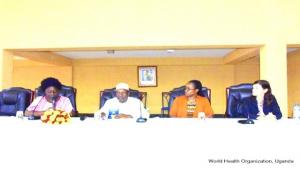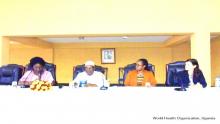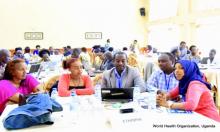Countries commit to extending HIV & AIDS services closer to children and adolescents at the African Regional meeting on HIV & AIDS
Entebbe 22nd September 2015:- The Workshop ended on a good note with countries discussing their specific roadmaps on how they are going to make delivery of HIV & AIDS services to children and adolescents better. Each country came up with 10 priority programs upon which they will base to deliver HIV & AIDS to children and adolescents.
Dr. Martina Penazzato from World Health Organization (WHO) expressed her gratitude to Uganda for hosting the workshop. She also said that a lot of concerted effort was needed to tackle HIV &AIDS in children and adolescents in saying “we know that the progress we are making at the global level in terms of reducing Mother to Child transmission is not going to solve the problem.” She further stressed the need to prioritize HIV & AIDS in children and adolescents. She committed WHO’s support to deal with the problem.
Ms. Miriam Namugere, Focal Person Adolescent at the Ministry of Health (MOH), Uganda, thanked the participants for their participation. She particularly thanked UNICEF and WHO for the financial and technical support. She further said that there is an opportunity for Uganda to address the continuum of care for Reproductive, Maternal, Newborn, Child and Adolescent Health (RMNCAH). She also stressed the need to explore service delivery models that complement each other; facility, community and family based approaches. community health systems and health care system synergies
Dr. Musa Bungudu UNAIDS Country coordinator in his closing remarks commended WHO and UNICEF and Ministry of Health for a successful meeting organized. Mr. Bugudu asked the participating countries to embark on implementing the actions discussed when they return home and ensure that their governments are actively involved. He also called for inclusion of the discussed plans in the Global Fund proposals so as to get funds for them and implement them.
The key take-home messages from the meeting were;
An AIDS-free generation is within reach, and it starts with identifying HIV exposed and infected children and adolescents access to ART, implemented Elimination of Mother to Child Transmission of HIV & AIDS (EMTCT) interventions under the 4 prongs.
They were asked to increase domestic investments to the HIV and AIDS response highlighting that in 2014, about 57% of AIDS investments came from domestic sources and 50 countries invested more than 75% of their responses.
Service integration with a policy on integration and taking advantage to achieve maximum impact for pediatric and adolescent HIV and AIDS prevention, care and treatment cascade under the continuum of care was also stressed.
They were also asked to strive to have treatment access that is equitable addressing the need to stop children and adolescents from lagging behind adults on access to antiretroviral therapy (ART).
The need to address contradictory legal and policy provisions on consent (to sex, marriage, HTC, FP health services) as these perpetuate stigma and discrimination. Address age-related barriers to HIV services, family planning.
Reference to service delivery considerations in WHO guidelines on prevention, care and treatment for children and adolescents was also stressed as well as WHO quality standards.
Countries were advised to strengthen strategic information to include improving data quality, scale up electronic medical reporting (EMR), analysis and use of data decentralized to lower health facility levels.
Transition health care for adolescent-friendly projects to adolescent-responsive health systems -Involve young people in programs that affect them (design, implementation, M&E). Consider age appropriate and current innovations
The four day workshop was full to capacity with participation from WHO, World Bank, UN Women, UNESCO, UNICEF, Global Fund, Botswana, Cameroon, Ethiopia, Ghana, Kenya, Malawi, Namibia, Nigeria, South Africa, Swaziland, Switzerland, Tanzania, Uganda, USA, Zambia and Zimbabwe as well as the media.
___________________________________________
For more information, please contact:
Mwebembezi Edmond, Public Information Officer, Tel.: +256 414 335569, Cel.: +256 782 962674, Email: mwebembezie [at] who.int (mwebembezie[at]who[dot]int)
Below:
01. Left to right Ms. Miriam Namugere MOH, Mr. Musa Bungudu UNAIDS , Dr. Susan Kasedde UNICEF and Dr. Martina Penazzato WHO at the closure of the workshop





